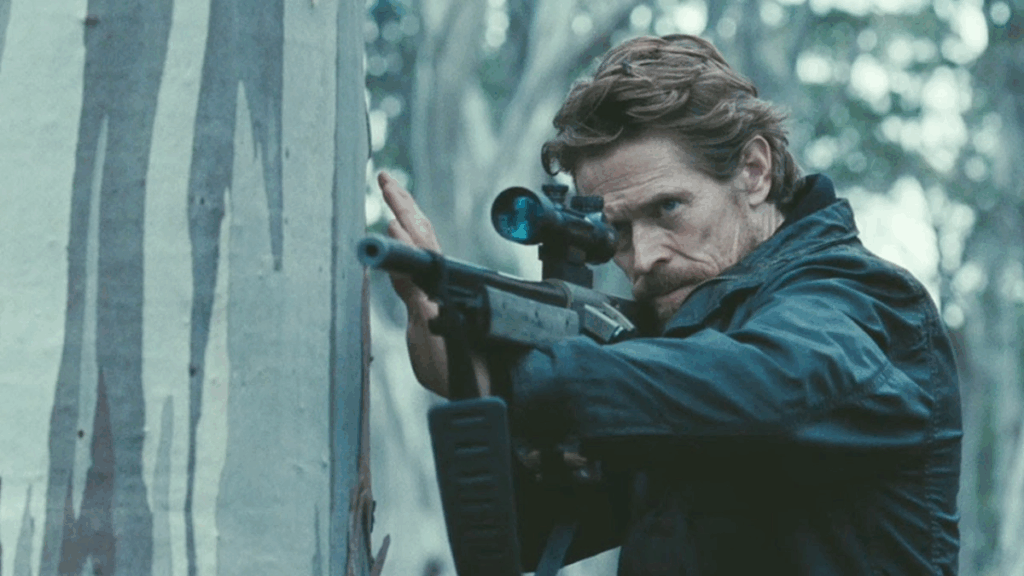Hunter (2011) – A Gripping Tale of Obsession in the Tasmanian Wilderness

System: visuals, The Hunter (2011) is an unforgettable cinematic experience. Directed by Daniel Nettheim and adapted from Julia Leigh’s 1999 novel, this Australian drama-thriller stars Willem Dafoe in a tour-de-force performance as a solitary mercenary on a mission that tests the boundaries of his humanity. Set against the rugged, untamed landscapes of Tasmania, The Hunter is a gripping exploration of obsession, sacrifice, and the delicate balance between man and nature. Below is an in-depth introduction to this haunting and thought-provoking film.
Overview

The Hunter is a 2011 Australian drama-thriller set in the rugged wilderness of Tasmania. The film follows Martin David, a skilled mercenary hired by a secretive biotech company to hunt the last Tasmanian tiger, a creature believed to be extinct. As Martin navigates the harsh terrain and a suspicious local community, his mission becomes entangled with personal connections and ethical dilemmas, leading to a climactic choice that tests his humanity.
- Director: Daniel Nettheim
- Writers: Julia Leigh (novel), Wain Fimeri (adaptation)
- Cast: Willem Dafoe, Frances O’Connor, Sam Neill, Morgan Davies, Sullivan Stapleton
- Runtime: 1 hour 42 minutes
- Release Date: September 29, 2011 (Australia)
- Genre: Drama, Thriller, Adventure
- Language: English
- Country: Australia
Plot Summary

Martin David (Willem Dafoe), a solitary and disciplined mercenary, is hired by the mysterious biotech company Red Leaf to track down the last Tasmanian tiger (thylacine), a marsupial thought to be extinct but rumored to still roam Tasmania’s wilderness. Red Leaf seeks the creature’s DNA, believed to hold the key to a powerful weapon, and instructs Martin to eliminate any remaining tigers to prevent competitors from accessing it. Posing as a university researcher, Martin arrives in Tasmania and lodges at the home of Lucy Armstrong (Frances O’Connor), a grieving woman whose husband, an environmentalist, vanished in the same wilderness. Lucy’s two children, Sass and Bike, form a bond with Martin, drawing him into their fractured family.
As Martin ventures deeper into the Tasmanian bush, setting traps and tracking elusive signs of the tiger, he encounters hostility from locals suspicious of outsiders and protective of their land. His mission is further complicated by evidence of a rival hunter, environmental tensions, and the discovery of Lucy’s husband’s fate. As Martin grows closer to the Armstrong family, his cold professionalism begins to crack, forcing him to confront the moral cost of his mission. The film builds to a haunting climax where Martin must decide between duty and humanity, set against the stark beauty of Tasmania’s wilderness.
Note: The film contains scenes of violence, animal hunting, and emotional intensity, suitable for mature audiences.
Why You Should Watch

The Hunter is a multifaceted film that excels on several levels:
- Willem Dafoe’s Masterful Performance: Dafoe delivers a riveting portrayal of Martin, a man whose stoic exterior hides inner conflict. His expressive silence and physicality dominate the screen, making every moment compelling.
- Stunning Cinematography: The Tasmanian wilderness, captured by cinematographer Robert Humphreys, is a character in itself—lush, unforgiving, and breathtakingly beautiful, enhancing the film’s atmosphere of isolation and danger.
- Ecological and Ethical Themes: The film explores corporate greed, environmental destruction, and the moral weight of hunting a near-extinct species, inviting viewers to reflect on humanity’s impact on nature.
- Tense and Unpredictable Narrative: While slow-paced at times, the story balances Martin’s solitary hunt with emotional connections to the Armstrong family, leading to an unexpected and poignant resolution.
- Cultural Insight: The film highlights tensions between Tasmania’s rural communities and external forces, offering a glimpse into local struggles and environmental debates.
Themes and Symbolism

The Hunter delves into themes of loneliness, redemption, and the clash between progress and preservation. Martin’s hunt for the Tasmanian tiger symbolizes an obsession with control over nature, while his growing bond with the Armstrong family represents a rediscovery of humanity. The film questions the ethics of exploiting endangered species and the personal toll of living a life driven by duty. The Tasmanian landscape, vast and untamed, mirrors Martin’s internal struggle, blurring the lines between hunter and hunted.
Reception and Impact

The Hunter received generally favorable reviews, earning a 72% rating on Rotten Tomatoes based on 90 reviews (average 6.54/10) and a Metacritic score of 63/100 from 15 critics. Critics praised Willem Dafoe’s commanding performance and the film’s stunning visuals but noted its slow pacing and occasional predictability as drawbacks. Some felt the subplot with the Armstrong family detracted from the main narrative, while others found it emotionally resonant. The film has been lauded as a thought-provoking ecological drama and a showcase for Dafoe’s ability to carry a film.
Audience reactions highlight the film’s atmospheric tension and Dafoe’s gripping performance, with some calling it a “somber yet thought-provoking” exploration of corporate greed and human connection. Others found it “cringe-worthy” or overly slow, though its cinematography and setting were universally praised. On X, users have described it as “reeeeeal trippy” and a unique adventure-thriller worth watching.
Final Thoughts
The Hunter (2011) is a haunting and visually stunning film that combines a thrilling hunt with deep emotional and ethical questions. Willem Dafoe’s powerhouse performance, paired with Tasmania’s breathtaking landscapes, creates an unforgettable cinematic experience. Whether you’re drawn to character-driven dramas, environmental themes, or tense thrillers, The Hunter delivers a primal and introspective journey that lingers long after the credits roll.